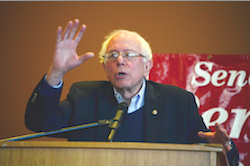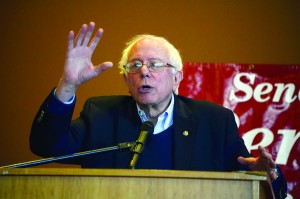

copyright the Chronicle February 18, 2015
by Joseph Gresser
LYNDONVILLE — The U.S. needs a “political revolution” to rebuild a vibrant democracy, said U.S. Senator Bernie Sanders Monday afternoon.
“What I mean is not to burn down buildings or shoot people,” Senator Sanders said. He urged the approximately 75 students, faculty, and members of the public who gathered at Lyndon State College to become engaged in the political process and especially to vote.
“The issues we’re talking about are almost as important as the Super Bowl and football — I don’t want to carry it too far,” Mr. Sanders joked.
He was quite serious, though, when he began the meeting by saying, “The bottom line is our country faces probably more serious problems than any time in the modern history of our country. If climate change is included, in the whole history of our country.”
Democracy is a relatively new idea, Mr. Sanders said. The increased role of money in American politics could undermine the country’s democracy, he added.
He attacked the Citizens United Supreme Court decision, saying it has already allowed the wealthiest Americans to have a disproportionate influence in politics.
Pointing at a Lyndon State student, he said billionaires “can go up to someone and say, ‘Chris, want to be governor of Vermont? Want to be a congressman? Here’s $50-million, here’s your speech writer.’”
The end of Mr. Sanders’ scenario had the wealthy sponsor reminding his successful candidate, “Remember, you work for us.”
These wealthy people, Mr. Sanders said, “have an extremely reactionary agenda.”
As a result of such people putting large amounts of money into the political process, the playing field has been shifted to favor their interests, he said.
Over the past 40 years the country has seen an explosion in technology and productivity that allows each worker to produce more in a shorter period of time, said Mr. Sanders.
Despite that increase in productivity the amount going to the middle class is shrinking, he said.
“The typical male worker is making, on average, $800 less than seven years ago in inflation adjusted dollars,” Senator Sanders said. “The average woman is making $1,000 less.”
As a result, the disparity in income between the richest members of society and the poorest is greater than it has ever been, he added.
“Today in America, the top one-tenth of 1 percent owns more than the bottom 90 percent. One family, the Waltons, owns more than the bottom 40 percent of the population. Since the Wall Street crash of 2008, over 99 percent of all new income created has gone to the top 1 percent,” Mr. Sanders said.
“Is that the kind of nation we want to live in?” he asked. “Are we comfortable with the highest rate of childhood poverty among industrialized countries?”
Switching to the issue of climate change, Senator Sanders said he is “embarrassed to work in a body whose majority rejects what scientists say about climate change.”
Greenhouse gases, he said, “are already producing devastating problems around the country and around the world.”
The problems of climate change and money in politics intersect in that wealthy donors such as the Koch brothers are also in the fossil fuel business and want to continue to produce oil and coal regardless of the cost to the environment.
Mr. Sanders turned to another issue of interest to his audience.
“This world is a competitive world. For the sake of our economy, it is imperative that everyone get the education he or she needs regardless of their finances,” he said, pointing out that “in other countries education is free or virtually free.”
The average student graduates from college with a debt of $27,000, he said. Mr. Sanders told about meeting a doctor recently who graduated with $350,000 in student loans.
He said the current system does not make sense, and “we must invest in higher education, not just for young people, but anyone in the country who wants or needs more education should be able to get it.”
Mr. Sanders pointed to what he said is the main thing keeping policies such as the ones he suggested from being enacted.
“We can bring forth a political revolution if we don’t have elections like the one in November, where 60 percent didn’t vote and 80 percent of young people didn’t vote. If we keep having that kind of election, the billionaire and millionaire class will remain in charge,” he said.
Three Lyndon State College students gave their opinions on these topics.
Jame Robertson said he has learned to be frugal and holds three part-time jobs as he works to pay his $7,900 annual tuition.
Mr. Robertson said he knows students who have had to cut back on the number of classes they can take in order to find time for their jobs.
Loan forgiveness programs are advertised on the radio, he said, but are not easy to enroll in or qualify for as they might be.
Climate change was the major concern for Josh Gilman, who pressed Mr. Sanders for his opinion of a proposed natural gas pipeline that is being built on the western side of the state. Mr. Gilman questioned the certificate of public good standards as applied by the state Public Service Board as well as the wisdom of bringing a new fossil fuel to Vermont.
Mr. Sanders said the pipeline is largely a state issue and not one he is fully up-to-date on. He said he is a strong supporter of all types of sustainable energy.
People objected to seeing wind towers on ridgelines and to seeing solar farms as well, Mr. Sanders said. He said he doesn’t see either as harming the view, but is more interested in dealing with climate change issues.
Jake Zani said he shares Mr. Sanders’ concern about money in politics and the influence its donors wield.
In answer to a question for Steve Amos, a Wheelock selectman, about how to pay for education and health care, Mr. Sanders said many large corporations pay no taxes.
Hedge fund managers, who make millions of dollars a year, pay taxes at the same rate as truck drivers, he said. Congress, he said, ought to tell such people and corporations, “guess what, you’re part of American and you have to pay your share.”
At the same time, unemployment rates are much higher than generally believed, Mr. Sanders said. While the number given by the U.S. department of Labor is about 5.8 percent, the actual number, when people working part-time jobs and those who have given up hope for ever finding work are taken into account, the actual number is 11 percent, he said.
A campaign to rebuild the country’s infrastructure would help both unemployment and the country’s roads and bridges, he said.
Mr. Sanders said he has introduced a bill that would tax corporate wealth and put the proceeds toward infrastructure repair.
“On issue after issue, people think business should start paying its fair share,” Mr. Sanders said. He urged people to organize and march on the capital to make elected officials “an offer they can’t refuse — do as we ask if you want to get re-elected.”
Mr. Sanders left the ball to the applause of the crowd and headed to Johnson State College for a similar event.
According to his longtime aide Phil Fiermonte, a Derby native, Mr. Sanders will head to Iowa later in the week to see if it makes sense for him to make a run for the presidency.
contact Joseph Gresser at [email protected]
For more free articles from the Chronicle like this one, see our Editor’s Picks pages. For all the Chronicle’s stories, subscribe:
Print subscription
Annual online subscription
Short-term online subscription







